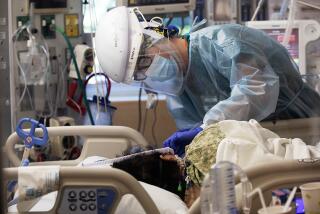Getting a flu shot can be sticking point with healthcare workers
- Share via
As a nurse at a Downey hospital, Darlene Andres spends her days caring for postpartum mothers and their newborn babies. Andres urges new moms to get the flu vaccine before leaving.
But Andres, 36, decided not to get the flu shot herself. Andres — a self-proclaimed “germ freak” — said she just washes her hands instead.
“I heard from a lot of co-workers on the floors that they were getting a lot of symptoms after getting the flu vaccine,” she said. “I kind of got scared.”
On Friday, public health officials warned that the flu wreaking havoc elsewhere has finally arrived in California and is now causing widespread hospitalizations across the state. The increase in illnesses so early could signal a worse flu season than in years past.
As flu cases increase, hospital administrators are grappling with whether to compel doctors, nurses and other medical staff to get vaccinated. Each year, only about 60% of hospital workers get the shot, according to a report by the California Department of Public Health. The federal government has set a goal of 90% by 2020.
State and federal health officials said Friday that it’s important for healthcare workers to get immunized because their jobs put them in a position to spread the virus to large numbers of patients. Moreover, hospitals need them to stay well during the busy flu season.
“The flu is particularly severe, particularly deadly among folks that have underlying conditions, and these are the very folks you find in hospitals,” said Gil Chavez, deputy director of the center for infectious diseases for the California Department of Public Health.
Under state law, hospitals must offer the shot to their employees free of charge and workers must sign a declaration if they don’t want it. But no law mandates medical centers to require their staff to get vaccinated. That has led to a hodgepodge of rules around the state.
“What is happening right now is that there is an unfortunate patchwork of policies,” said Jan Emerson-Shea, spokeswoman for the California Hospital Assn., which supports a vaccination requirement for healthcare workers. “In some hospitals, patients may be … more at risk.”
Administrators have made vaccination a condition of employment at some facilities. At others, they instruct employees to get the shot or wear a mask for the entire flu season. Many simply hold education sessions on the flu vaccine — such as debunking the widespread myth that it causes the illness — and encourage staff members to get it.
Several county public health officials have taken the matter into their own hands, issuing orders that healthcare facilities must require their workers to get the vaccine. Officials disagree whether nursing homes and residential homes for the disabled or elderly also should be subject to the mandate — even though older people can be especially at risk.
Sonoma County’s health officer, Lynn Silver Chalfin, said she decided to issue an order because vaccination rates were too low. “We needed to take action,” she said. “It’s really important for healthcare institutions to be safe places for their patients.”
There are limited studies on the effect of vaccination among healthcare workers at hospitals, but some research at nursing homes shows that it can lead to fewer patient deaths.
However, Los Angeles County’s director of public health, Jonathan Fielding has not issued such an order. He urges hospitals to vaccinate their employees but said he believes the decision should be up to individual hospitals. The vaccine, Fielding said, is 62% effective, so he said he didn’t want to give the false impression that it was the perfect antidote.
As of this weekend, Downey Regional Medical Center is on full flu precaution mode. Security officers stationed at the entrances instruct everyone to use hand sanitizer. They restrict children from entering, and they distribute masks to anybody who is coughing or sneezing. Signs tell patients how to prevent the spread of the flu.
For months, the hospital has been offering the flu shot to its staff. As of this week, about 72% of all employees had been vaccinated. Nearly 20% have declined, some because of allergies, or religious or personal views. Chief Operating Officer Rob Fuller said having healthcare workers vaccinated is a patient safety issue and he is doing everything possible to make that happen, but he does not want to force them. “The problem is you are running head-on into some deeply held beliefs that the vaccines are ineffective,” he said. “We try to be reasonable about it.”
Sherlyn Ocampo, a nurse who works on the medical/surgical unit at the hospital, said she gets the vaccine every year because her patients are elderly, fragile and ill.
“I don’t want to get sick,” she said. “I don’t want to get my patients sick.”
Emergency room doctor Naveed Natanzi got the vaccine after being “nudged” by the hospital administrators. “I did it for the sake of our patients,” he said.
On the door to the employee health office is a sign: “Protect yourself and those around you — get vaccinated.” Inside, soothing instrumental music is playing when Brian Virk, who works in medical records, comes to get his shot on a recent morning.
Virk said he put it off until more and more people started getting sick. Nurse Connie Meinke, who gives out cookies to employees who come in, told Virk to sit down and relax his arm. She pulled up his right shirt sleeve and rubbed his shoulder with a small alcohol swab.
“You ready, Brian?” she said. “A little stick.”
She injected the needle. A few seconds later, she pulled it out and applied a Band-Aid. “I didn’t even feel it,” Virk said.
At Huntington Hospital in Pasadena, medical staff members are urged to get the shot but not required to do so.
“We respect our employees’ rights to make decisions about their care,” said spokesman Kevin Andrus.
Other hospitals in the area, including Kaiser, UCLA and Keck Hospital of USC, have similar voluntary policies. But at the three L.A. County-run hospitals, as well as Children’s Hospital Los Angeles and Long Beach Memorial Medical Center, employees have to wear a mask for the entire flu season if they decline the shot.
Even if healthcare workers don’t yet have flu symptoms, they still may be contagious, administrators said.
“Patients should be able to make an assumption that if they are coming into the hospital … they are not going to be infected by their healthcare provider,” said Susan Melvin, chief medical officer for Long Beach Memorial.
The California Nurses Assn. opposes forcing workers to get the shot or wear a mask. The association nevertheless recommends the vaccine for its members, said one of the presidents, DeAnn McEwen. In some states, including Indiana, nurses and others have been fired for refusing the vaccine.
“We disagree with punitive and coercive-type policies because they create a hostile work environment,” she said.
The nurses association emphasizes that there are other ways to guard against the flu, including washing hands, covering one’s cough and staying home when sick. And it argues that there is not enough evidence about the effectiveness of a mask.
State legislation proposed last year would have set new rules for hospitals, designed to increase the number of healthcare providers getting vaccinated, but it was vetoed by the governor.
Doctors and nurses get the flu just like everybody else, so they have a professional duty to get immunized for their patients’ safety, said Richard Thorp, president-elect of the California Medical Assn., which sponsored the bill.
“We all agree that you come to the hospital to get well,” he said, “not to get sick.”
More to Read
Sign up for Essential California
The most important California stories and recommendations in your inbox every morning.
You may occasionally receive promotional content from the Los Angeles Times.













